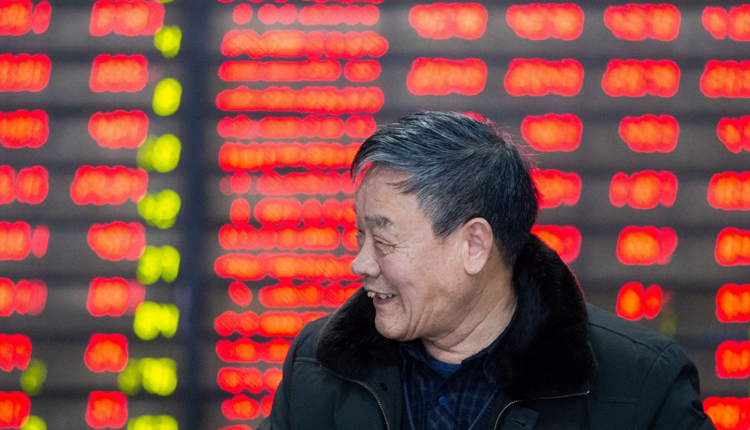Stocks in China fell on Thursday as bills backing protesters in Hong Kong were signed into law by U.S. President Donald Trump on Wednesday.
Mainland Chinese stocks dropped on the day, with the Shanghai composite 0.47 percent lower at about 2,889.69 and the Shenzhen component shedding 0.27 percent to 9,622.14. The Shenzhen composite fell 0.259 percent to approximately 1,597.85.
Hong Kong-listed shares of Alibaba continued to witness strong gains as they jumped 5.59 percent following their blockbuster debut on Tuesday, ahead of the broad market as the Hang Seng index ended 0.22 percent lower at 26,893.73.
Elsewhere, the Nikkei 225 in Japan ended 0.12 percent lower at 23,409.14 while the Topix index finished its trading day 0.17 percent lower at 1,708.06. Shares of Panasonic soared 2.82 percent after the Nikkei Asian Review reported Thursday that the firm will sell its semiconductor business to Taiwan’s Nuvoton Technology.
South Korea’s Kospi also shed 0.43 percent to end at 2,118.60. Meanwhile, shares in Australia grew, with the S&P/ASX 200 finishing its trading day 0.2 percent higher at 6,864.00.
Overall, the MSCI Asia ex-Japan index traded 0.24 percent lower.
Trump signed into law two bills supporting protesters in Hong Kong, according to a White House statement. That move came despite previous objections by China amid ongoing trade negotiations between Beijing and Washington for an anticipated “phase one” deal.
Hong Kong’s government on Thursday voiced strong opposition to the U.S. move, saying it will send the wrong signal to protesters, Reuters reported.
“I don’t think it makes (the deal) less likely,” Todd Mariano, U.S. director at Eurasia Group, told CNBC’s “Squawk Box” on Thursday. “It’s certainly an unwanted speed bump, i think, for the White House as it’s trying to close out this deal.”
“Hong Kong being such an issue of strategic national significance … for China and Trump having facing such an overwhelming vote in Congress, you know, puts him in a very difficult spot … on an issue that is extremely sensitive for the Chinese leadership,” Mariano added.
Market sentiment has gained a boost in recent days amid positive rhetoric on the U.S.-China trade front. On Tuesday, Trump said negotiators were close to reaching an initial trade deal. His upbeat comments on trade followed a phone call between officials from the U.S. and China. The negotiators agreed to keep working on remaining issues.
“I think at the moment, right now, the markets are still giving the benefit of the doubt,” Ken Wong, Asia equity portfolio specialist at Eastspring Investments, told CNBC’s “Capital Connection” on Thursday.
“You’re not only hearing some positive or strong signals coming from the U.S. but you’re also hearing some strong signals coming from China as well,” Wong said. “The markets are anticipating, hopefully in the next couple of months, we do get an agreement in place.”
Wall Street record highs
Overnight stateside, stocks surged in yet another record session. The S&P 500 gained 0.4 percent to close at 3153.64 while the Nasdaq Composite ended its trading day 0.7 percent higher at 8705.18. The Dow Jones Industrial Average added 42.32 points to close at 28,164. The averages posted fresh intraday records and notched their fourth straight day of gains.
Markets were bolstered by stronger-than-expected U.S. economic data. Durable goods orders surged 0.6 percent in October, while economists expected a decline of 0.8 percent. Weekly jobless claims, meanwhile, dropped to 213,000 from 227,000. Third-quarter GDP was revised to show growth of 2.1 percent — up from a previous reading of 1.9 percent.
Meanwhile, the Federal Reserve’s summary of economic conditions — better known as the Beige Book — showed the central bank witnessed the economy expanding modestly between October and mid-November.
Currencies and oil
The U.S. dollar index, which tracks the greenback against a basket of its peers, was at 98.313 after touching highs above 98.4 yesterday.
The Japanese yen traded at 109.38 per dollar after seeing highs below 108.8 earlier in the week. The Australian dollar changed hands at $0.6762 after declining from levels above $0.678 yesterday.
Oil prices fell in the afternoon of Asian trading hours, with international benchmark Brent crude futures shedding 0.28 percent to $63.88 per barrel. U.S. crude futures fell 0.59 percent to $57.77 per barrel.
Source: CNBC


